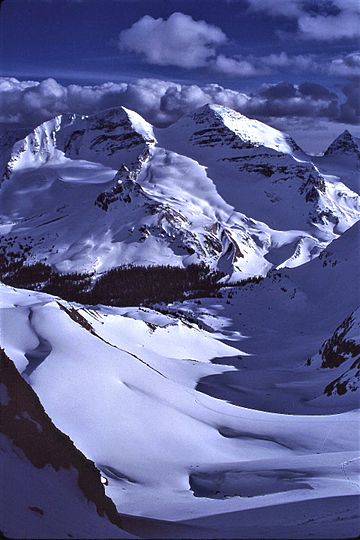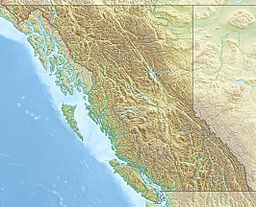The President (mountain) facts for kids
Quick facts for kids The President |
|
|---|---|

The Vice President & The President (l-r) from isolated col (skiout to Stanley Mitchell hut)
|
|
| Highest point | |
| Elevation | 3,123 m (10,246 ft) |
| Prominence | 658 m (2,159 ft) (above Kiwetinok Pass) |
| Geography | |
| Parent range | President Range Canadian Rockies |
| Topo map | NTS 82N/10 |
| Climbing | |
| First ascent | 1901 by James Outram, Christian Kaufmann and Joseph Pollinger |
| Easiest route | scramble |
The President is a tall mountain peak located in British Columbia, Canada. It is part of the President/Vice-President Massif within the President Range. This amazing mountain is found in the eastern part of British Columbia.
You can find The President mountain just north of Emerald Lake. It is inside the beautiful Yoho National Park. The mountain is also very close to the Alpine Club of Canada's Stanley Mitchell hut, which is a popular place for hikers and climbers to stay.
How The President Mountain Got Its Name
The mountain was first named Shaughnessy in 1904. A famous mountain climber named Edward Whymper gave it this name. He named it after Thomas Shaughnessy. Mr. Shaughnessy was the president of the Canadian Pacific Railway at that time. A "president" is a leader, often of a big company or even a country.
However, in 1907, the Alpine Club of Canada decided to change the mountain's name. They found out that another mountain in the Selkirks already had the name "Shaughnessy." To avoid confusion, they renamed it "The President." This new name still honored its connection to a president, but it also made sure the mountain had a unique name of its own.
Weather at The President Mountain
The President mountain experiences a subarctic climate. This means it has very cold and snowy winters. The summers are usually mild, not too hot.
Temperatures in this area can drop quite low. It can get colder than −20 degrees Celsius (which is about −4 degrees Fahrenheit). When you add the wind chill, it can feel even colder, sometimes below −30 degrees Celsius (−22 degrees Fahrenheit). This type of climate is based on the Köppen climate classification system, which helps scientists describe different climates around the world.
 | Shirley Ann Jackson |
 | Garett Morgan |
 | J. Ernest Wilkins Jr. |
 | Elijah McCoy |


